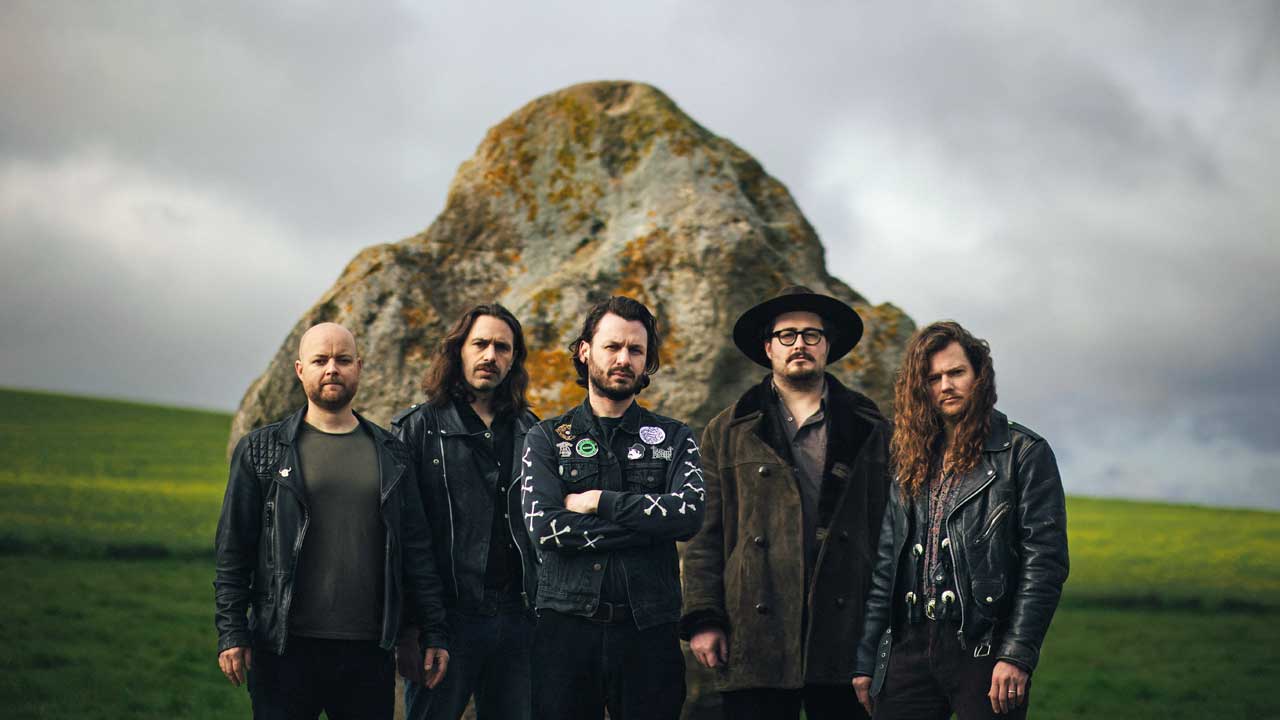“Someone will send me photos of reindeer that inexplicably died in a circle and say, ‘This is so Green Lung!’ I’m like, ‘Yeah! This is working!’” How rising occult stars stumbled into a genre of their own
When guitarist Scott Black asked his grandmother for a Machine Head album, she bought him Deep Purple’s Machine Head – and so began a journey into mixing folk prog with 70s rock

Scott Black spent his childhood immersed in the myths of the English countryside. The Green Lung guitarist grew up in rural Devon and used to pass the time playing with his friends in a disused quarry. Back at home, he’d be told that the quarry was stalked by a woodwose: a hair-coated wild man straight from Arthurian fables. And it wasn’t just a bedtime story that grown-ups invented for children’s ears, either.
“Even the old blokes at the pub that your dad would hang out with used to talk about it,” he tells Prog. “Growing up very close to Dartmoor, before the internet, all of those legends seemed very plausible.”
Since Green Lung formed in 2017 they’ve presented a distinctly folklore-inspired take on classic rock. Their full-length debut, Woodland Rites, juxtaposed the riffing of Black Sabbath – who formed amid the smog of industrial Birmingham – against lyrics about forest rituals and witches’ covens.
Their 2021 follow-up, Black Harvest, was self-categorised as the soundtrack to the folk-horror film inside the band’s heads. Now This Heathen Land pushes Green Lung both deeper into the countryside and farther from comparison to any band before them.
The five-pieces’ third album is a convergence of swaggering hard rock, theatrical organs and quiet, occult folk music. It’s what would happen if Rising-era Rainbow lured Atomic Rooster to a pagan ceremony in the heart of an English forest.
Second single Maxine (Witch Queen) pays tribute to Cheshire- born priestess Maxine Sanders, and is driven by danceable drum beats and twirling, prog-like keyboards. The Ancient Ways is a cavalcade of proto-metal riffs dedicated to Crockern Tor and Wistman’s Wood (“haunted” landmarks in Black’s native Devon), while Song Of The Stones uses folky acoustic guitars and retells the 1892 Grant Allen ghost story Pallinghurst Barrow. In simply pulling the genre from the cityscape, Green Lung are making 70s-indebted heaviness fresher than it’s sounded in a generation.
“Black Sabbath and Judas Priest are two of the bands we like, and they sit in that city, industrial context,” lead singer Tom Templar explains. “But it’s not like we’re a bunch of ‘metal or die’ guys. We listen to a really broad range of stuff. In prog and in folk, there’s tons of it: a million prog rock bands have sleeves where they’re in a wood or by a river.”
Sign up below to get the latest from Prog, plus exclusive special offers, direct to your inbox!
Black adds: “We very specifically wanted to make This Heathen Land a love letter to albums produced by Martin Birch in the mid-1970s, like Deep Purple’s Stormbringer and all the Rainbow albums. It was a time when metal hadn’t calcified into what it became. It was pre-New Wave Of British Heavy Metal, with weird synths and a lot of prog influence everywhere. There were a lot of eccentric musical choices that we wanted to evoke on this record.”
While countless rock fans are nostalgic for the era of music that Green Lung are emulating, Black and Templar aren’t among them. The duo are only 33 and 34, respectively, meaning that the halcyon days of Sabbath, Rainbow and 70s prog happened a decade and a half before they were born. But, again, it was their upbringing in the country that gave the pair an appreciation for the classics.
“I grew up in rural Norfolk with fuck-all to do,” Templar laughs. “My friends were listening to Black Sabbath, Deep Purple and all the old-school shit, because it’s still there in those kinds of places. If you walk into a pub in rural Norfolk, you’ll probably see an AC/DC tribute band onstage – it’s still there!
“My dad used to play me Neil Young and Leonard Cohen, which I totally fell in love with,” the singer continues, “and I remember buying a compilation from Woolworths that had Metallica on it. I only just got into [2000s metal band] Lamb Of God, so I’ve always been 20 years behind!”
If you walk into a pub in rural Norfolk, you’ll probably see an AC/DC tribute band onstage – it’s still there!
Tom Templar
Meanwhile, 300 miles away in the West Country, Black initially had more contemporary tastes. He got into the nascent angst of nu metal and 90s/00s metal as a pre-teen, including Limp Bizkit, Linkin Park and Machine Head.
“I asked my nan for a Machine Head CD in 2002 – and she got me Machine Head by Deep Purple,” the guitarist says with a laugh. “At first, I hated it, but I gradually fell in love. It did a hard reset on my metal journey.”
“When you really get into metal, you tend to pick yourself a sub-sub-sub-subgenre,” adds Templar. “I was a doom guy. Sabbath loomed so large, and that era was still influencing newer bands like Cathedral and Electric Wizard. It’s a weirdly backwards-looking genre.”
The pair began playing with bands in their respective hometowns, but the constraints of rural life soon began to show, for both their careers and musical futures. “In the small town I grew up in, the employment opportunities were the local bakery or being a tradesman,” Black remembers.
He upped sticks to London to study, and eventually corralled the instrumental players of what would become the first Green Lung line-up. Unable to find a singer, the four-piece considered ploughing on without vocals altogether – but, laughs Black, “We were nowhere near good enough to do that kind of thing.”
Templar also moved to the capital, bringing with him ideas from Norfolk that tapped into the occult, folkloric aura which would later become a signature of Green Lung.
A lot of British folklore stuff is done in a twee, silly way… I needed to land it in this place where it felt mysterious, exciting and interesting
Tom Templar
“When I was moving from my parents’ house, I found a bunch of old lyrics that weren’t that far from Green Lung, even then,” he recalls. “It sat with me. A lot of that British folklore stuff, it’s done in a twee, silly way. I’m not saying that Green Lung isn’t sometimes silly, but I needed to land it in this place where it felt mysterious, exciting and interesting; not the Morris-dancey, ‘hey-nonny-no’ end of folklore.”
The singer and the rest of the band linked up over the internet. From there, they evolved organically from traditional stoner doom to the ambitious, genre-splicing rock they play on This Heathen Land, growing their audience and beginning to take their music seriously.
“We started the band with the idea of just playing small pub venues,” says Black. “When we made Woodland Rites, we’d never played to more than 10 people; so we made it thinking, ‘Let’s just do a catchier Sabbath album.’ When people start paying attention, you start to think about what it is you’re doing.”
Momentum built quickly – between Woodland Rites and Black Harvest, Green Lung signed to indie label Svart (home to such prog alumni as Ianai and Onségen Ensemble), then with the announcement of album number two were profiled in The Guardian and reached the top of the Bandcamp pre-order charts. In the run-up to This Heathen Land, they leapt to Nuclear Blast Records, meaning they now share a roster with Nightwish, Enslaved and Cellar Darling.
After you release a record, you need to just let it be. You need a bit of a honeymoon period
Scott Black
As for what they’ll evolve into, Green Lung have no clue. “There’s a British folk singer-songwriter called Richard Dawson, who said something that really resonated with me,” says Black. “And that’s: after you release a record, you need to just let it be. You need a bit of a honeymoon period. So, honestly, I have no idea what’s next.”
No matter what they make going forward, though, Templar wants Green Lung to be remembered as having built their own unique thematic and musical universe.
“I want us to be a band who create a world that, sonically and lyrically, stands on its own,” he says. “Someone will send me photos of a load of reindeer that inexplicably died in a circle and say, ‘This is so Green Lung!’ I’m just like, ‘Yeah! This is working!’”

Louder’s resident Gojira obsessive was still at uni when he joined the team in 2017. Since then, Matt’s become a regular in Metal Hammer and Prog, at his happiest when interviewing the most forward-thinking artists heavy music can muster. He’s got bylines in The Guardian, The Telegraph, The Independent, NME and many others, too. When he’s not writing, you’ll probably find him skydiving, scuba diving or coasteering.
